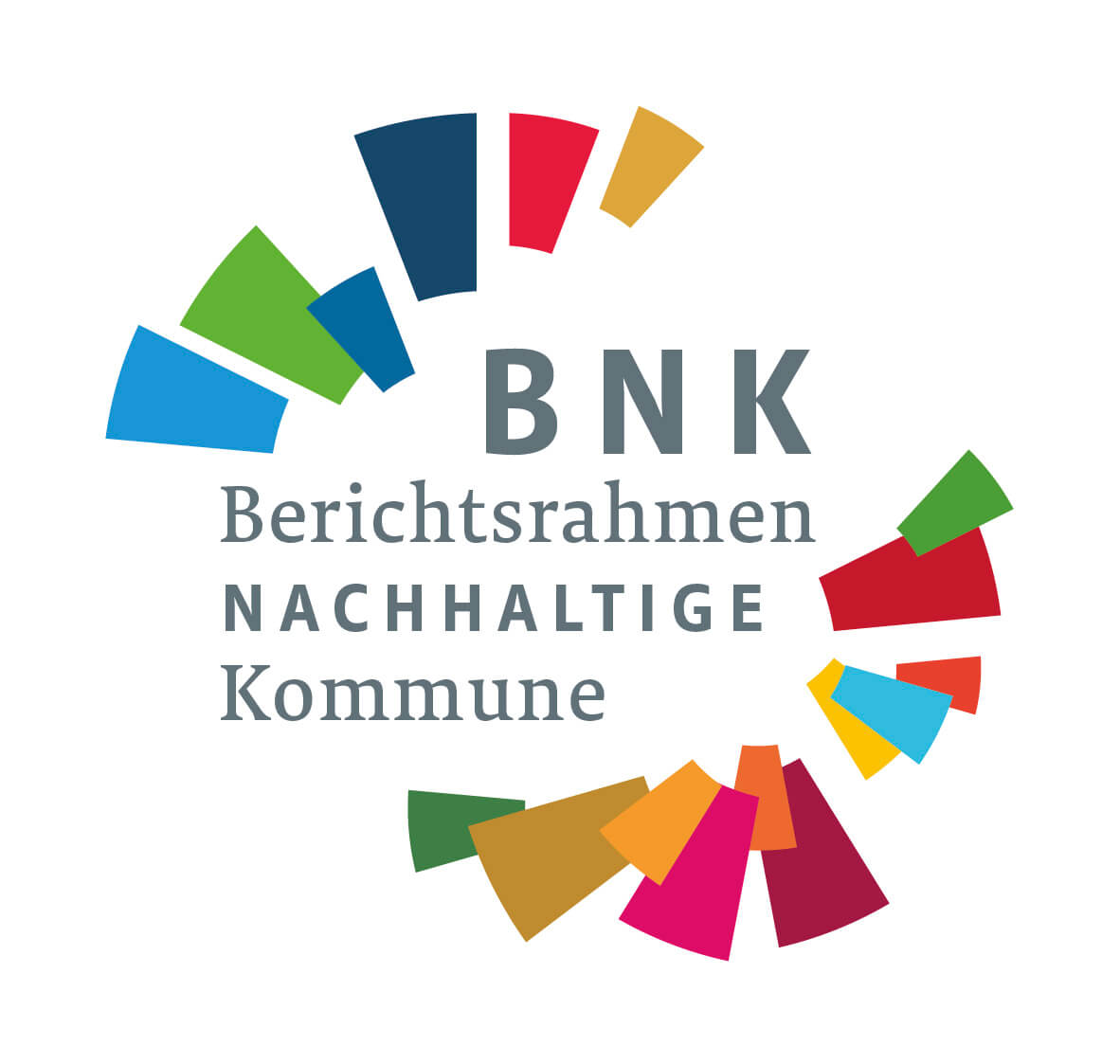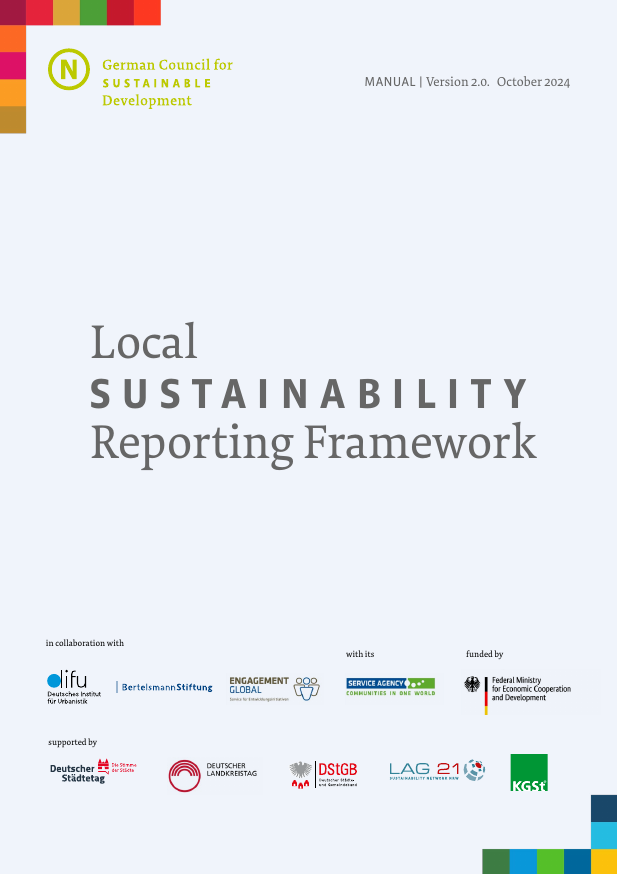The Local Sustainability Reporting Framework (BNK) helps local authorities to render their progress on matters of sustainable development in the community measurable and thus steerable.

In partnership with SKEW, the BNK was systematically trialled in 20 municipalities in various Länder, also in Pirna. Photo: © Jens Dauterstedt|||||
Local action as the key to achieving sustainability goals
Climate and biodiversity protection, the mobility transition, a sustainable economy, health or social justice – all areas where local action is instrumental in the achievement of the wider sustainability goals. The global challenges we face simply cannot be resolved without the contribution of municipalities.
The new BNK: Control mechanism and transparency standard
With the Local Sustainability Reporting Framework, the RNE (German Council for Sustainable Development) provides an important tool for sustainability reporting supported by a wide range of partners.

The BNK helps local authorities throughout Germany to anchor sustainability across departments in local administrative dealings and manage it efficiently across the wider ‘municipal enterprise’. Local sustainability reporting should therefore be seen as a building block in an integrated local sustainability management system. The guide to the new BNK was published in October 2024 and is now available for all local authorities to use, whatever their size, location or financial capacity.
Why do we need a standard for voluntary local sustainability reporting?
Local sustainability strategies define goals for sustainable development in the community and signpost the way there with specific measures. To evaluate the progress towards sustainable development and to communicate it transparently both internally and to the outside world, local authorities are increasingly producing their own – normally recurring – sustainability reports. As such, the reporting takes on an important role as a tool for managing sustainable development in local governments. Because, judiciously employed, a sustainability report can achieve a great deal: creating transparency, measuring progress, making achievements visible, revealing where readjustments are needed and identifying gaps. The German Sustainability Code (DNK), as the standard for corporate sustainability reporting, was the inspiration behind the BNK’s development. The core content themes of the BNK follow a holistic understanding of sustainability and always factor in the local reach and sphere of action.
At a glance: What makes the new BNK stand out?
- Policy-oriented: The reporting framework offers local governments, regardless of size, comprehensive guidance on compiling sustainability reports, by defining content-based requirements within various navigation criteria and action points that cover all relevant aspects of current German and international sustainability policy.
- Compact contents: Comprising a set of 62 mandatory Aspects and 19 Core Indicators, the reporting framework is widely adaptable and also leaves room for local authorities to add their own individual content.
- Flexible structure: The BNK allows flexible arrangement of the report content and supports both first-time users to take stock and experienced municipalities to monitor their sustainability strategies.
- Targeted reporting for the ‘municipal enterprise’: In the interests of integrated sustainability management, the BNK simplifies reporting in connection with the municipal corporations and participating interests, avoids redundancies and invites scrutiny of the strategic steering effect across the wider ‘municipal enterprise’.
- Local visibility in a multi-level system: The reporting framework enhances the visibility of local contributions to global goals, as local contributions to, for example, the 17 global Sustainable Development Goals (SDGs) or the German Sustainable Development Strategy will also be able to be shown moving forward.
- Dynamic learning: The cross-departmental drafting of the report creates new structures in the municipal administration, which ideally also become established over the long term.
Basics of reporting
Across 62 Aspects, the BNK defines key topics of sustainable development in the community, on which local authorities document their goals, strategies, measures and results. These Aspects are assigned to 8 management criteria and 11 policy fields to aid clarity. Users must also report on 19 Core Indicators taken from the set of SDG Indicators for Municipalities. A further 39 Recommended Indicators can be applied, as can customised ones.
If a local authority cannot provide information about a requested Aspect or Indicator, they can give brief reasons for this instead (comply-or-explain principle). This approach encourages transparent reporting and strengthens the credibility of the reports as well as the understanding of sustainability as a dynamic learning process.
Curious? Find out all you need to know in the BNK Guide.
Target group? You decide!
A BNK-based sustainability report can be prepared and communicated for a variety of target groups, as needed. Which formats of the report are provided and the style of each one is up to the local authority itself. Instead of dictating rigid specifications, the BNK serves as a minimum content guide to which of the municipality’s activities are relevant to sustainability and therefore significant for a BNK-compliant report. Relevant simply means taking into account the specific needs of the corresponding target group.
Expected to launch in mid-2025, the Bertelsmann Foundation’s online Portal for Sustainable Communities will allow users to create digital local sustainability profiles based on the BNK and integrate them into the website of their reporting municipality.
Development of the BNK: Beta version and pilot phase
In 2021, the RNE published the first draft of a framework for local sustainability reporting. Since this beta version was released, the BNK has been road-tested by over 30 local authorities throughout Germany between 2021 and 2024. The pilot was part of the “Globally sustainable communities” programme of the Service Agency Communities in One World (SKEW), with funding from the Federal Ministry for Economic Cooperation and Development (BMZ).
In North Rhine-Westphalia, the state working group Agenda 21 NRW (LAG 21 NRW) supported ten local authorities with their reporting as part of the “Globally sustainable communities NRW” project. Also within this context, three so-called Voluntary Local Reviews (VLR) were produced in NRW based on the BNK-guided sustainability report. The local equivalent to the Voluntary National Reviews, VLRs report on the status of sustainable development to the United Nations within the scope of its High-Level Political Forum (HLPF).
Based on this experience and accompanied by a wide-ranging stakeholder process, the BNK was comprehensively updated. The process was conducted in collaboration with the German Institute of Urban Affairs (Difu), the Bertelsmann Foundation and SKEW, and supported by the municipal umbrella organisations, Agenda 21 (LAG 21 NRW) and the local government association for public administrators KGSt.
Interested?
Local authorities can download the Manual to the Local Sustainability Reporting Framework to help them use the BNK. To have your BNK-based report labelled with the BNK logo, please contact the RNE office.
BNK-based municipal sustainability reports
Some 30 local authorities throughout Germany have now used the BNK framework. The following reports are available to the public (in German only):
Baden-Württemberg
- Stadt Kirchheim unter Teck, reporting year 2023
Bavaria
- Stadt Aschaffenburg, reporting year 2021
- Stadt Ingolstadt, reporting year 2021
Bremen
- Freie Hansestadt Bremen, reporting year 2023
NRW
- Bundesstadt Bonn, reporting year 2022
- Landeshauptstadt Düsseldorf, reporting year 2022
- Stadt Dortmund, reporting year 2022
- Kreis Euskirchen, reporting year 2022
- Gemeinde Kalletal, reporting year 2022
- Stadt Köln, reporting year 2022
- Alte Hansestadt Lemgo, reporting year 2022
- Kreis Heinsberg, reporting year 2023
- Stadt Soest, reporting year 2022
Rhineland-Palatinate
- Stadt Speyer, reporting year 2023
Saxony
- Garnisonsstadt Frankenberg, reporting year 2021
Anna Lotta Nagel
German Council for Sustainable Development
Project Manager
anna.nagel@nachhaltigkeitsrat.de
+49 (0) 30 338424-534
Office c/o GIZ GmbH
Potsdamer Platz 10
10785 Berlin
